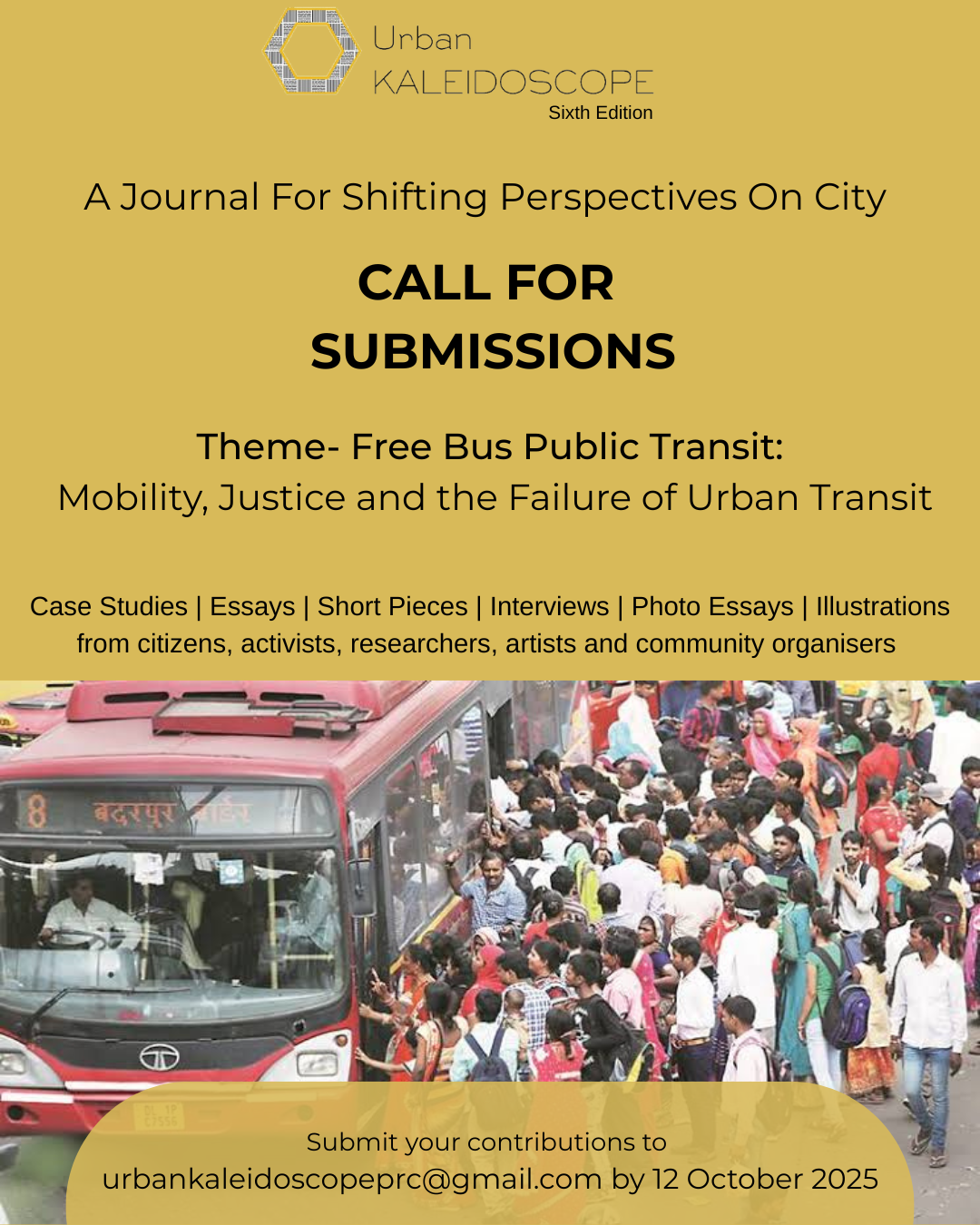Urban Kaleidoscope 6th Edition
Call for Submissions
Theme: Free Bus Public Transit: Mobility, Justice and the Future of Urban Transit
The urban landscape is a kaleidoscope of interconnected elements that come together to form vibrant tapestries of city life. Drawing inspiration from this imagery, Urban Kaleidoscope, a quarterly journal by People’s Resource Centre, supports shifting perspectives on cities. By amplifying the voices of citizens, scholars, activists, researchers, artists, academicians, professionals, and diverse community stakeholders, the journal seeks to foster critical discourse and cultivate a collective space for generating ideas aimed at building democratic, sustainable, and inclusive cities.
The forthcoming edition turns its attention to fare-free bus systems, a policy experiment that has gained momentum globally as an instrument of mobility justice. In many cities, buses remain the most accessible and widely used mode of public transport, connecting neighbourhoods, enabling access to work, education, and healthcare, and carrying the weight of everyday urban life. Making buses fare-free does more than reduce travel costs: it challenges exclusionary practices in mobility, redistributes resources, and expands the possibilities of more equitable, democratic, and sustainable cities.
Delhi’s 2019 initiative of free bus travel for women illustrates the transformative potential of this policy. The scheme led to a 20% increase in women’s bus ridership, with one in four women reporting that they had started using buses regularly (Centre for Policy Research, 2020). For low-income women, the policy freed up as much as 8% of household income, resources that could be redirected towards food, health, or children’s education (DTC & GNCTD, 2021). These figures underline how the bus, when made fare-free, becomes not just a vehicle of mobility but of social and economic empowerment.
Globally, bus-based fare-free initiatives demonstrate similar impacts. In Belgrade, the decision to introduce free bus rides for its residents and visitors in Jan, 2025 modernised infrastructure and expanded inclusion (CGTN, 2025). In Malta, the nationwide adoption of free bus services for residents in 2022 marked a major step towards reducing car dependency and encouraging collective travel (Times of Malta, 2022). Rural counties in Washington State, USA, have also pioneered bus-only fare-free models, ensuring access to essential services for dispersed populations where mobility would otherwise be prohibitively expensive.
Earlier experiments, such as Hasselt in Belgium, where abolishing bus fares led to a thirteenfold increase in ridership (Van Goeverden et al., 2006), and Dunkirk in France, where ridership surged following fare abolition, demonstrate how buses flexible, relatively low-cost, and deeply embedded in everyday life are uniquely positioned to anchor fare-free mobility policies. Unlike metros or trams, buses are capable of rapidly adapting to urban needs, extending connectivity to marginalised areas and making mobility accessible to those most often excluded.
By placing buses at the centre of fare-free mobility, these policies intersect directly with struggles for gender equality, environmental sustainability, and class justice. They reduce car dependence, lower household costs, and make visible the everyday politics of who gets to move freely in the city. Bus-based fare-free initiatives, often driven by grassroots activism, reclaim mobility as a right and challenge the logic of cities shaped by profit, congestion, and exclusion.
For this edition, Urban Kaleidoscope seeks contributions that critically and creatively engage with the idea of fare-free buses as a site of transformative urban politics. We invite analyses of policies, lived experiences of commuters, reflections on grassroots campaigns, and creative works that reimagine buses as spaces of solidarity and justice. Contributions from queer writers, artists, and activists, as well as marginalised voices across caste, class, and faith, are especially encouraged. Submissions are welcome in English or Hindi.
Submission Guidelines
Submissions should be compiled in the following order: title including author name; abstract (150 words) and keywords; introduction and methodology; findings and discussion.
In-text citations must be provided as appropriate, and all figure and table captions should be accurately sourced.
Articles should follow British English, use Times New Roman size 12 font with 1.5 spacing, and provide accurate referencing in APA format.
The word count should be a minimum of 2000 words, not including the abstract and references, with an upper limit of 2500–3000 words.
For creative submissions, please include a short introductory paragraph (150 words) about the work and captions for all photographs or artwork.
Word count for creative pieces may vary depending on the nature of the submission.
Contributions must not have been published elsewhere, though we operate under a copyleft ethos, allowing articles to be republished with the permission of author-contributors.
Deadline for Submission
Submit your Abstract by 25 September and Final submission by 12 October. The deadline for this issue is 13 October 2025. Please submit your contributions to urbankaleidoscopeprc@gmail.com. For queries, write to prc.india@yahoo.com or DM us on Instagram.
References
- Centre for Policy Research. (2020). Delhi’s free bus travel scheme for women: Early impacts.
- Delhi Transport Corporation (DTC) & Government of NCT of Delhi (GNCTD). (2021). Impact assessment of free bus rides for women in Delhi.
- CGTN. (2025, January 15). Belgrade mayor thinks free public transport is money well spent. CGTN. https://newseu.cgtn.com/news/2025-01-15/Belgrade-mayor-thinks-free-public-transport-is-money-well-spent-1Aa1nM5KKuA/index.html
- Times of Malta. (2022, October 28). Bus passengers were up 15% in first month of free public transport – minister. Times of Malta. https://timesofmalta.com/article/bus-passengers-15-first-month-free-public-transport-minister.990878
- Van Goeverden, C., Rietveld, P., Koelemeijer, J., & Peeters, P. (2006). Subsidies in public transport. Transport Policy, 13(4), 295–306.

